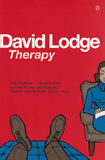 看完了卢密奇学院三部曲之后,又看了一本David Lodge的作品《Therapy》。想看洛奇的书是因为想看一些比较轻松又有点嘲的英语作品,这本《Therapy》算是达成了我一半的心愿。这本书的前半部份的确还是蛮有意思的,故事发展得还算搞笑。说的是英国某sitcom的创始人/主编得了一种稀奇古怪的病,就是膝盖会莫名的痛,手术开刀以为根治了实际却完全没有用。这一膝盖的内部失调引起一系列生活各个方面以及碰到的各种事情都内部失调。原本觉得很满意的生活急转直下,妻子突然提出离婚。与此同时,主人公深深迷上了克尔凯郭尔(Søren Kierkegaard),一名19世纪初的丹麦作家/哲学家。时时把克尔凯郭尔的生平和哲学观念和自己的对照甚至同步。由此之下,此书越来越缺乏嘲意。一开始在我脑海中还是壮年形象的主人公成了老年的印象:无奈且白费劲地想要以随便找人上床的方法来和妻子扯平,回忆起初恋情人并把千方百计寻找她作为生活中唯一的追求。好在这个故事最后有个好结局,似乎他的书最后都是好的结局。这一点很妙,因为在洛奇的书里,故事看起来都发展到了难以掌握的出了轨道的程度,最后总归会有个情理之中却让人很欣慰的好结局。
看完了卢密奇学院三部曲之后,又看了一本David Lodge的作品《Therapy》。想看洛奇的书是因为想看一些比较轻松又有点嘲的英语作品,这本《Therapy》算是达成了我一半的心愿。这本书的前半部份的确还是蛮有意思的,故事发展得还算搞笑。说的是英国某sitcom的创始人/主编得了一种稀奇古怪的病,就是膝盖会莫名的痛,手术开刀以为根治了实际却完全没有用。这一膝盖的内部失调引起一系列生活各个方面以及碰到的各种事情都内部失调。原本觉得很满意的生活急转直下,妻子突然提出离婚。与此同时,主人公深深迷上了克尔凯郭尔(Søren Kierkegaard),一名19世纪初的丹麦作家/哲学家。时时把克尔凯郭尔的生平和哲学观念和自己的对照甚至同步。由此之下,此书越来越缺乏嘲意。一开始在我脑海中还是壮年形象的主人公成了老年的印象:无奈且白费劲地想要以随便找人上床的方法来和妻子扯平,回忆起初恋情人并把千方百计寻找她作为生活中唯一的追求。好在这个故事最后有个好结局,似乎他的书最后都是好的结局。这一点很妙,因为在洛奇的书里,故事看起来都发展到了难以掌握的出了轨道的程度,最后总归会有个情理之中却让人很欣慰的好结局。这本书的背景不是学术界,而是电视行业,却同样是洛奇比较熟悉的领域,因为他也曾为自己写的书改编成电视剧过。在这本书里一针见血地指出了sitcom的真谛,是这么说的:
Most people in show business are perfectionists. They may be producing crap, acting in crap, writing crap, but they try and make it perfect crap. That's the essential difference between us and other people. If you go into the Post Office to buy stamps, the clerk doesn't aim to give you perfect service. Efficient, maybe, if you're lucky, but perfect - no. Why should he try? What's the point? There's no difference between one first-class stamp and another, and there's a very limited number of ways in which you can tear them off the sheets and shove them across the counter. He does the same transactions, day in, day out, year in, year out, he's trapped on a treadmill of repetition. But there's something special about every single episode of a sitcom, however trite and formulaic it may be, and that's for two reasons. The first is that nobody needs sitcom, like they sooner or later need postage stamps, so its only justification for existing is that it gives pleasure, and it won't do that if exactly the same as last week's. The second reason is that everyone involved is aware of the first reason, and knows that they'd better make it as good as it possibly can be, or they'll be out of a job. You'd be surprised how much collective effort and thought goes into every line, every gesture, every reaction shot. In rehearsals, right up to recording, everybody's thinking: how can we sharpen this, improve that, get an extra laugh there... Then the critics slag you off with a couple of snide sentences. That's the one drawback of television as a medium: television critics. (P.22)
另外,这本书里差不多有四分之一是和克尔凯郭尔有关的,讲了许多他的生平事迹和观点。他本来和与他互相恩爱的女友已经订下了婚约,他却觉得自己是永远不可能幸福的,为了不把自己的不幸带给所爱的人,他不听任何劝阻毅然解除婚约去到国外。这种行为也就思考能力发展到哲学家水平的人才会做得出来吧。他定义什么是最不快乐的人:
This is what it amounts to: on the one hand, he constantly hopes for something he should be remembering... On the other hand he constantly remembers something he should be hoping for... Consequently what he hopes for lies behind him and what he remembers lies before him... He is forever quite close to the goal and at the same moment at a distance from it; he now discovers that what it is that makes him unhappy, because now he has it, or because he is this way, is precisely what a few years ago would have made him happy if he had had it then, whereas then he was unhappy because he did not have it. (P.102)

No comments:
Post a Comment